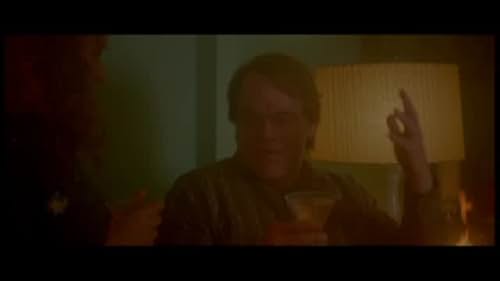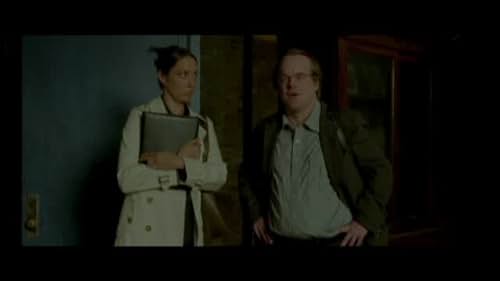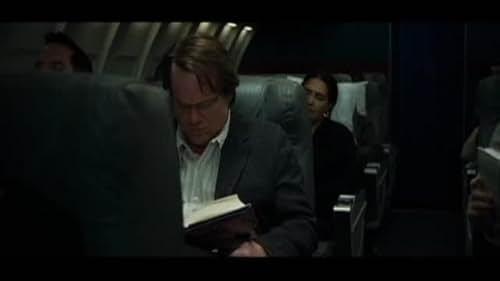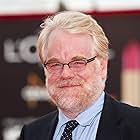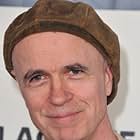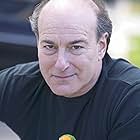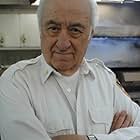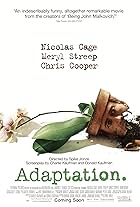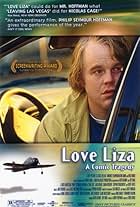A theater director struggles with his work and the women in his life as he creates a life-size replica of New York City inside a warehouse as part of his new play.A theater director struggles with his work and the women in his life as he creates a life-size replica of New York City inside a warehouse as part of his new play.A theater director struggles with his work and the women in his life as he creates a life-size replica of New York City inside a warehouse as part of his new play.
- Awards
- 8 wins & 29 nominations total
- Director
- Writer
- All cast & crew
- Production, box office & more at IMDbPro
Storyline
Did you know
- TriviaThe article that Caden reads in the doctor's waiting room, about his wife, is titled "It's Good To Be Adele." The intro paragraph reads, "Six months ago, Adele was an under-appreciated housewife in Eastern New York. Stuck in a dead-end marriage to a slovenly ugly-face loser, Adele Lack had big dreams for her and her then four-year-old daughter, Olivia. That's when her paintings got small."
- GoofsIn the scene where Caden is talking to Hazel directly after having talked to the doctor after his seizure, there is a dog in a box behind Hazel in her box office. Upon cutting to Caden, and then cutting back, the dog is gone. This is the remnants of the character "Squishy", from the original draft of the script. The almost-dead dog was found by Hazel after driving home from the premiere. She was saddened by Caden denying her, and she finds the dog, run over and bloody on the side of the road. She decides to keep it. This is the only scene where he is present, and his presence is not explained.
- Quotes
Pastor: Everything is more complicated than you think. You only see a tenth of what is true. There are a million little strings attached to every choice you make; you can destroy your life every time you choose. But maybe you won't know for twenty years. And you may never ever trace it to its source. And you only get one chance to play it out. Just try and figure out your own divorce. And they say there is no fate, but there is: it's what you create. And even though the world goes on for eons and eons, you are only here for a fraction of a fraction of a second. Most of your time is spent being dead or not yet born. But while alive, you wait in vain, wasting years, for a phone call or a letter or a look from someone or something to make it all right. And it never comes or it seems to but it doesn't really. And so you spend your time in vague regret or vaguer hope that something good will come along. Something to make you feel connected, something to make you feel whole, something to make you feel loved. And the truth is I feel so angry, and the truth is I feel so fucking sad, and the truth is I've felt so fucking hurt for so fucking long and for just as long I've been pretending I'm OK, just to get along, just for, I don't know why, maybe because no one wants to hear about my misery, because they have their own. Well, fuck everybody. Amen.
Caden Cotard: Amen.
Over the course of my teenage years I've seen Being John Malkovich through Eternal Sunshine (those two the M-word, masterpieces, with Adaptation and Confessions of a Dangerous Mind near-great, and Human Nature a fun minor work), and he's always given something to chew on for the brain. He's an incredible wit, maybe too incredible, like something that could combust with the amount of ideas and ruminations and skill at defining what's important to us as people and what we want out of art. Synecdoche, New York could be seen as his life-summation of what concerns him as a writer. And to call it art is simple, because it is: it is, alongside the something like Inland Empire, the most challenging work to come out of American cinema. To say that either one is flawed may come as something as a given, but for Kaufman it's somewhat more troubling.
This is a big film of ideas, crucial, life-affirming (or life-damning) thoughts about love and death and loss and forgiveness and, essentially, the process of trying to recreate and recreate and recreate this. But at the same time the intellect to engage full-tilt by Kaufman the writer, the director couldn't engage me as a viewer emotionally - at least at first. This changed on a second viewing - I'm reminded of Woody Allen's assertion on multiple viewings of 2001 that Kubrick was much ahead of him on what he was doing - but on a first impression I have to wonder, with everything going for Kaufman the satirist, the original, the sad dramatist, what the movie's audience really is. Like the play that is rehearsed for decades that Cotard never brings to his audience, what can one take away from Synecdoche, New York as far as connecting with the characters, or just Cotard?
Maybe it reveals something about me just talking about this; indeed this is probably the film of the season, if not just the year (Dark Knight fanatics take note), that you will want to talk about after it ends. As far as puzzling works of art go it's great for a good argument, especially if one is familiar with how Kaufman's work has been leading up to this point. It's not exactly that the film is ever so confusing that one will want to walk out - there is a logic, in a sense, to the life imitating art imitating life imitating art etc etc aspect that makes sense.
When Kaufman, as director, makes his film this time about as hopeful as Franz Kafka rewatching the Zapruder film on a loop, even the scenes and moments that *do* feel somewhat powerful emotionally (i.e. Hoffman seeing his daughter in a nudie-booth, or the final scene on the bed with Hoffman and Morton old and in bed with the house, once again, on fire) don't hit their mark - again, at least at first. It's almost as if seeing the film again it becomes deeper, more resonant; like any work of art at another point in one's life, it could change, and if one gives it the chance it does.
Certainly the cast makes it worthwhile to watch: Hoffman is what he is, brilliant at transforming physically as age goes by as Caden Cotard, and at delivering subtle moments of humor amid his health-decay; ditto in her own right to Morton, who ranges from bubbly and lustful to anrgy and dejected (Michelle Williams, too, shows this range); even a bit part by Dianne Wiest is appreciated. They all help to give life to what is a big, somber meditation on (quoting Douglas Adams) Life, the Universe, and Everything.
And yet, expressing my (initial) disappointment over the length (at 124 minutes it feels twice as long) or the music (did Kaufman order "kill-myself-piano-tunes-you'll-love off of ebay for this?) or the personal problem of connecting emotionally with some of the characters as they (intentionally) don't really grow, shouldn't, I hope, diminish recommending Synecdoche, New York for anyone who wants something to challenge them, provoke thought and discourse, to engage and disrupt brainwave patterns. Perhaps there should be some disappointment; like life, and the art pulled out of it with pliers, it's not always a pretty sight, especially near the end. But it is a unique journey I was glad to take, and I hope every few years or so to come back to it, and see if it changes me, or if I've changed, since seeing it last.
- Quinoa1984
- Nov 7, 2008
- Permalink
Details
- Release date
- Country of origin
- Official site
- Languages
- Also known as
- Todas las vidas, mi vida
- Filming locations
- Production companies
- See more company credits at IMDbPro
Box office
- Budget
- $20,000,000 (estimated)
- Gross US & Canada
- $3,083,538
- Opening weekend US & Canada
- $172,194
- Oct 26, 2008
- Gross worldwide
- $4,659,875
- Runtime2 hours 4 minutes
- Color
- Sound mix
- Aspect ratio
- 2.35 : 1
Contribute to this page





